A Summary of Imam al-Ghazâli’s The Revival of Religious Sciences (4 Volumes)
A Summary of Imam al-Ghazâli’s The Revival of Religious Sciences (4 Volumes)
Publisher:
IIPH (International Islamic Publishing House)
Author:
Salih Ahmad ash-Shami
Language:
English
Binding:
Hard Cover
Pages: 1600
Size: 14.5 x 21.5 cm
Couldn't load pickup availability
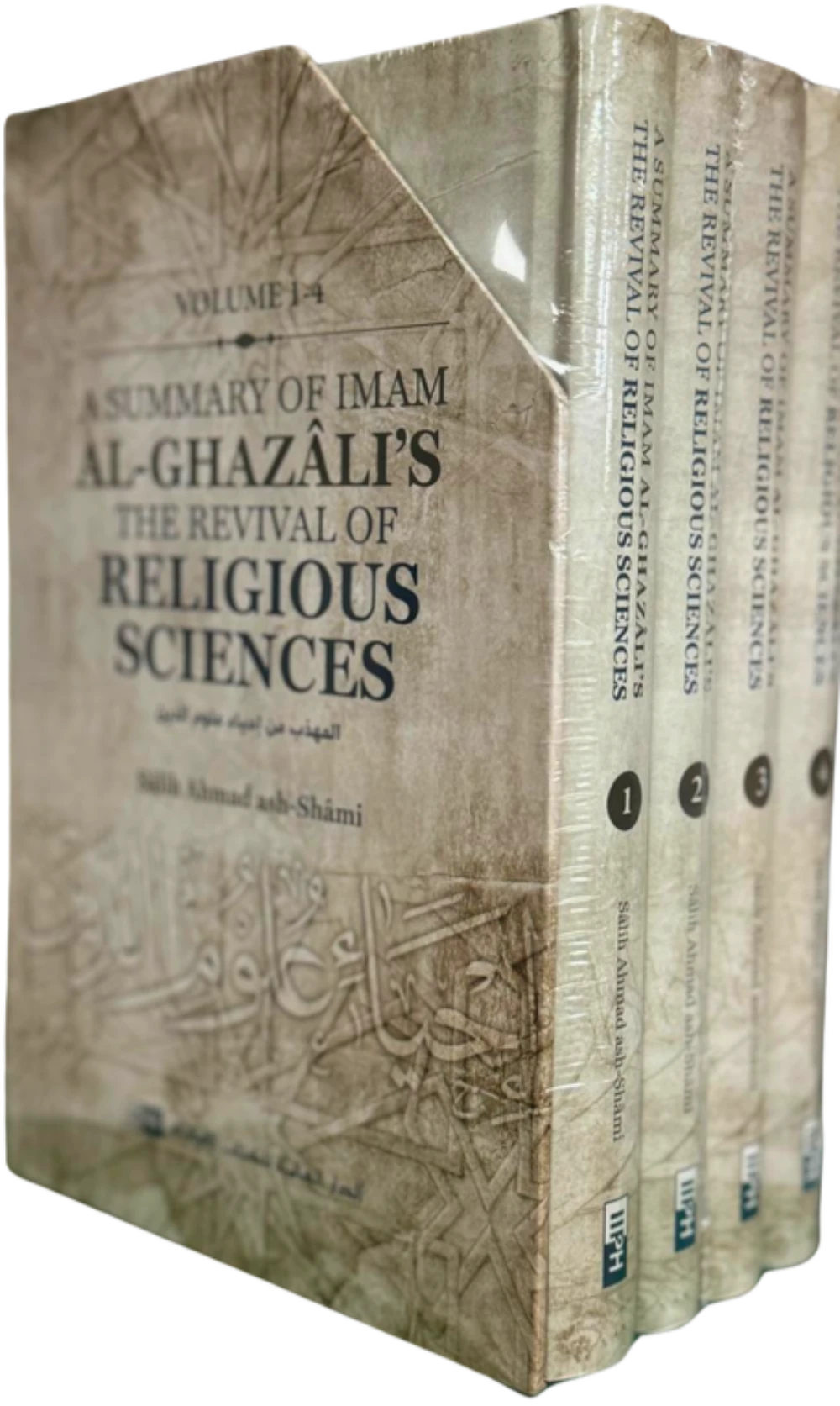
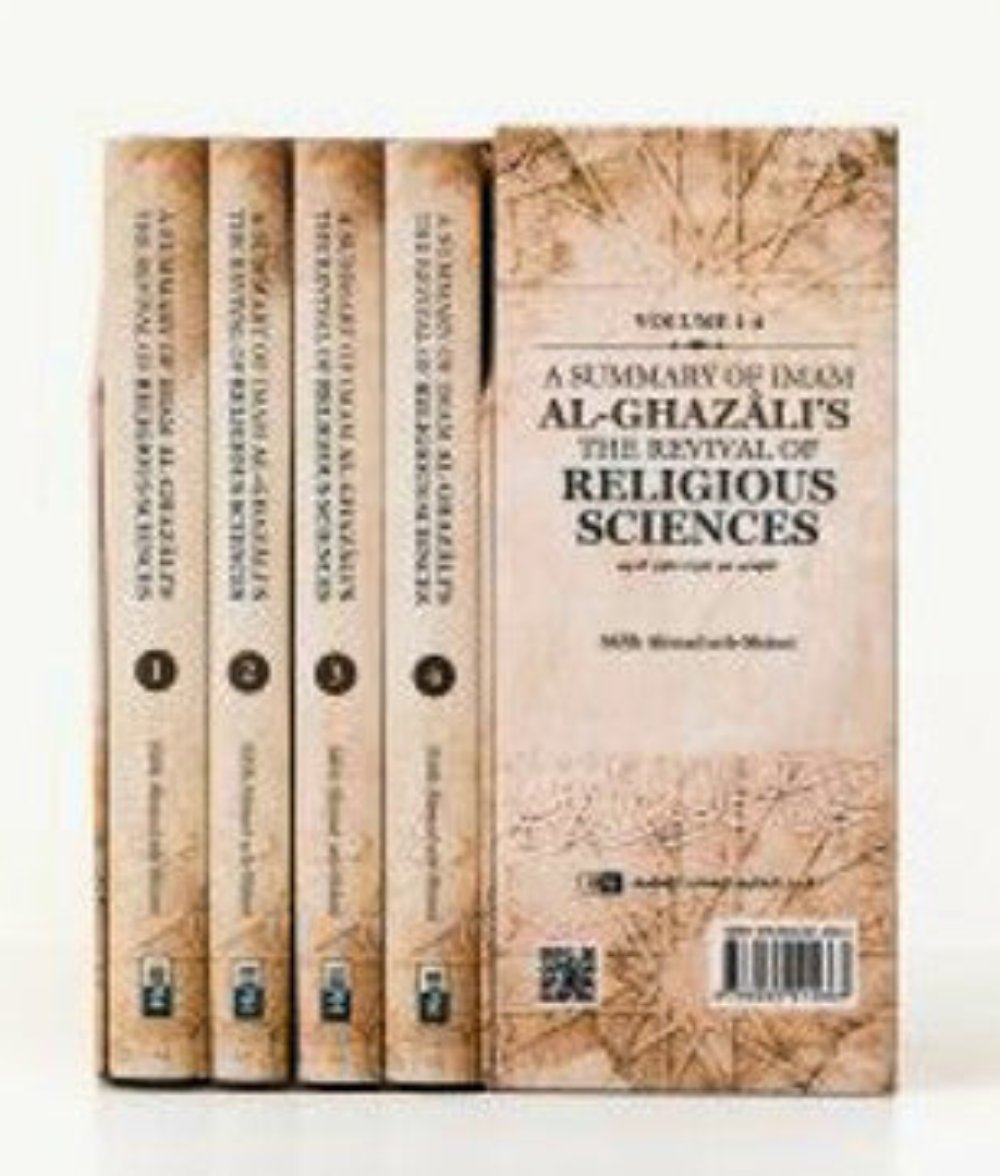
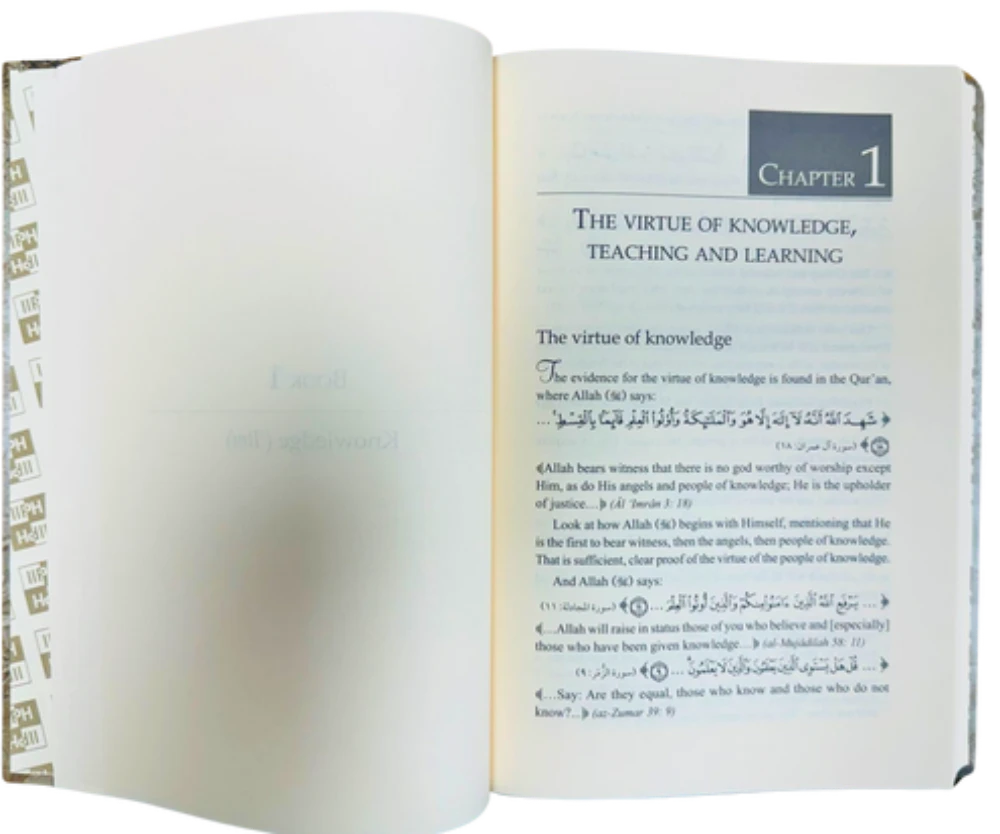
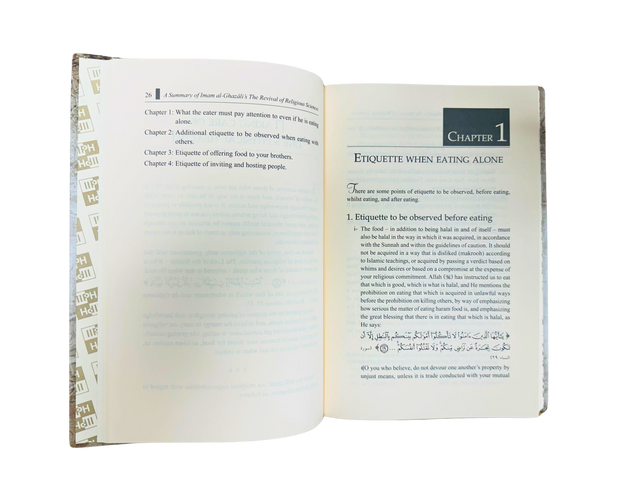
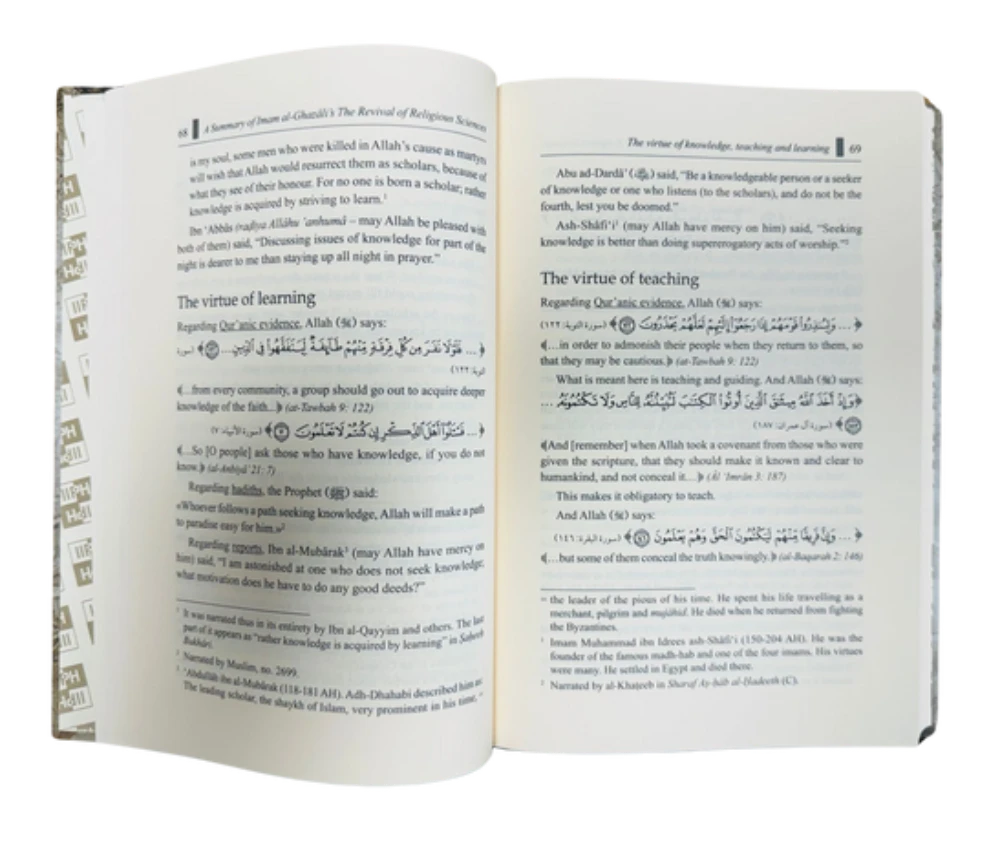
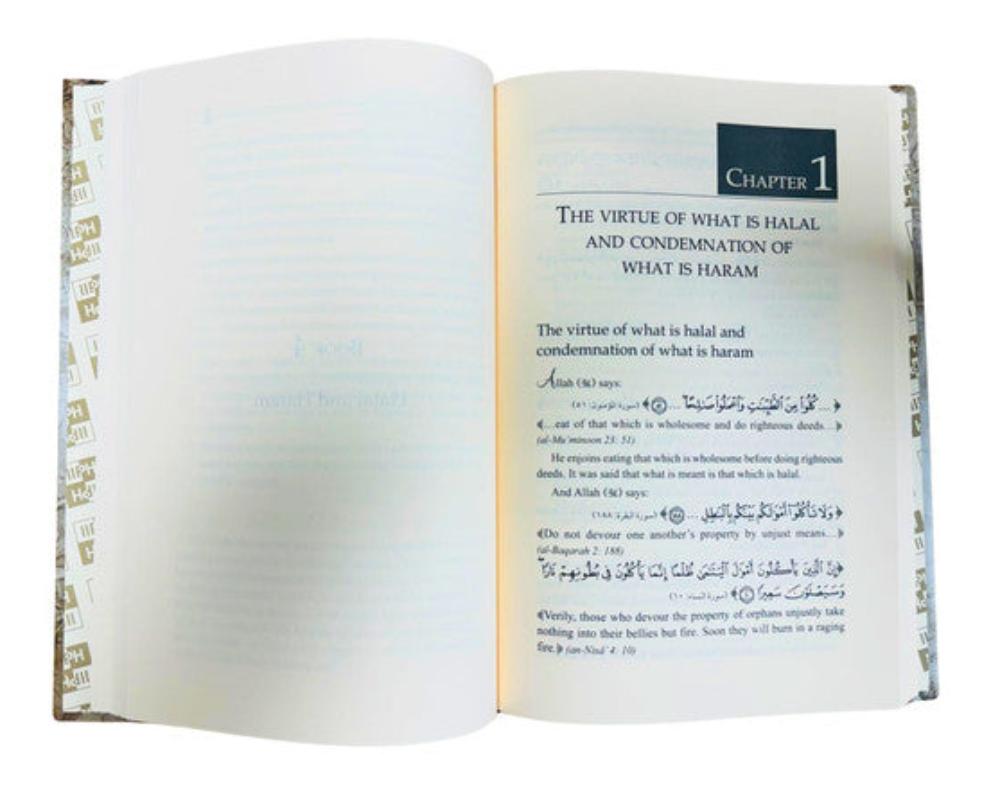
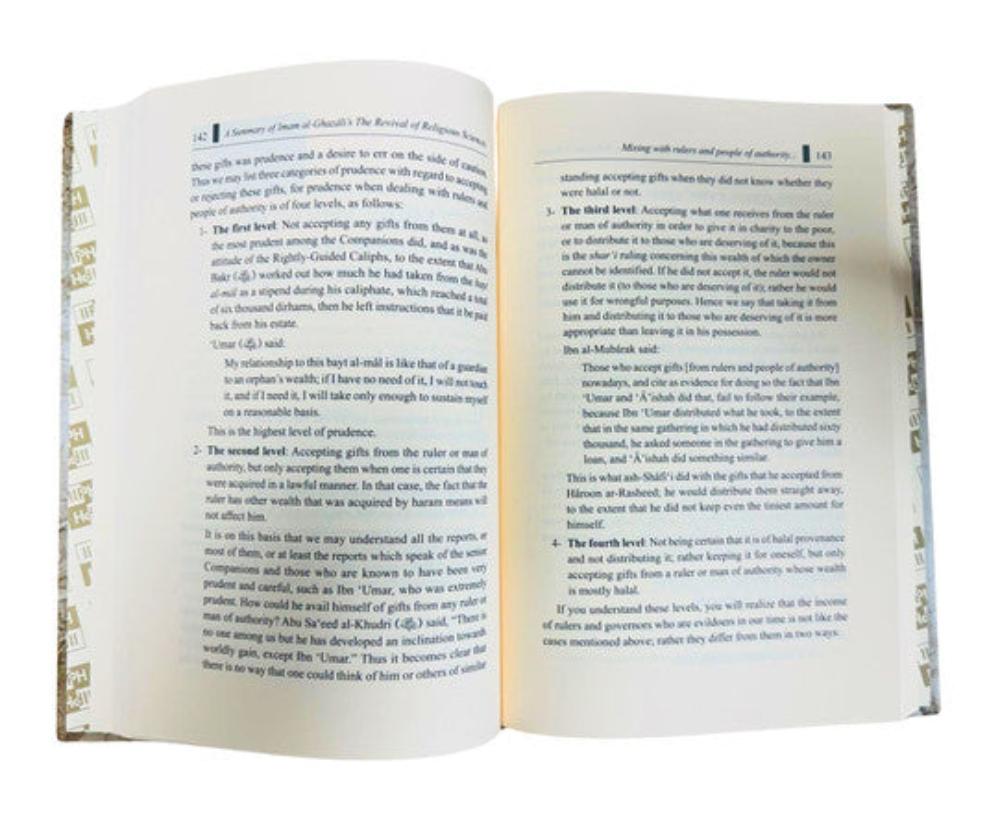
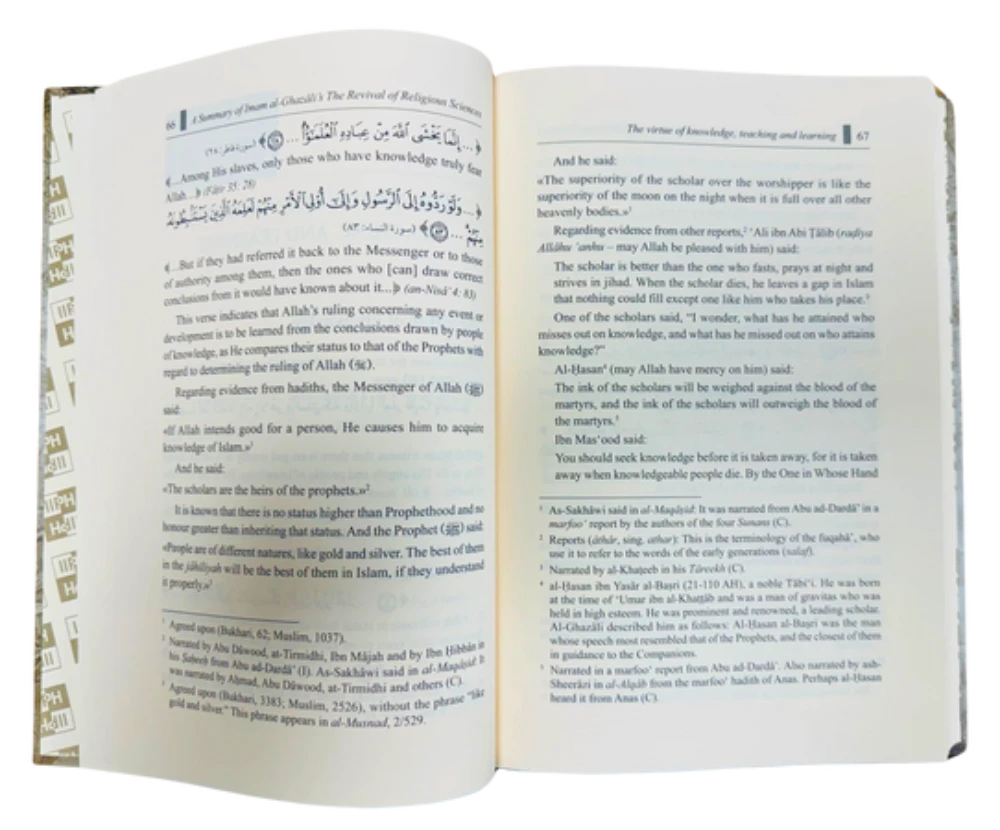
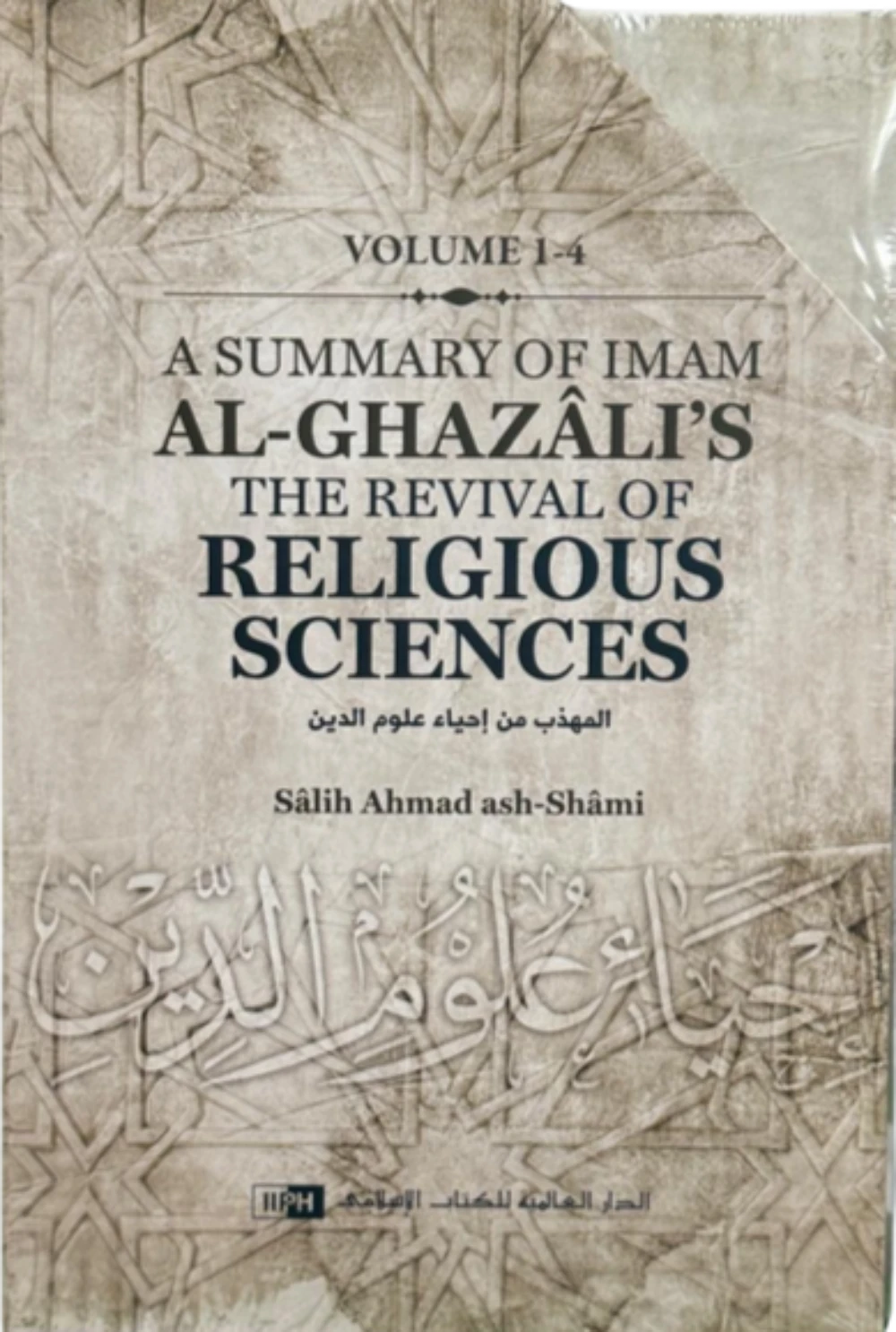
Collapsible content
Description of Book
A Summary of Imam al-Ghazâli’s The Revival of Religious Sciences (4 Volumes)
In this four-volume work, Shaykh Salih Ahmad ash-Shami has made commendable efforts to highlight some of Imam al-Ghazali’s best advice on various acts of worship, the etiquette to follow in everyday life, supplications to recite on different occasions, Islamic morals and manners, and destructive character traits. The book aims to make the reader foster a close relationship with Allah and attain salvation in the hereafter.
Publisher
IIPH (International Islamic Publishing House)
Author
- Salih Ahmad ash-Shami
Sample Pages - Content
THE REVIVAL OF RELESUMMARY OF IMAM AL-URACALEN THE REVIVAL OF RELIGIOUS SCIENCESSUMMARYAL GHAZALXINTHE REVIVAL OF RELIGIOUS SCIENCESA SUMMARY OF IMAM AL-GHAZALI'S THE REVIVAL OF RELIGIOUS SCIENCESVOLUME 14ASUMMARY OF IMAMAL-GHAZALI'STHE REVIVAL OFRELIGIOUS SCIENCESالمهذب من إحياء علوم الأدبيةAhmad ash-Shami14033Salih Ahmad ash ShamiHIPHSalih Ahmad ash-ShamiIPHVOLUMEA SUMMARY OF IMAM AL-GHAZALI'STHE REVIVAL OFRELIGIOUS SCIENCESSEMMANAM SLOBAZALSTHE REVTIAL OF PLUS SOMEBVOLUMEA SUMMARY OF IMAM AL-GHAZALI'STHE REVIVAL OFRELIGIOUS SCIENCESSEMMANAM SLOBAZALSTHE REVTIAL OF PLUS SOMEHal自CHAPTER 1THE VIRTUE OF KNOWLEDGE,TEACHING AND LEARNINGThe virtue of knowledgeThe evidence for the virtue of knowledge is found in the Qur'an where Allah (4) says:شَهِدَ اللَّهُ أَنَّهُ لَا إِلَهَ إِلَّا هُوَ والمليكة وأولوا العلم قايما بالقسط.(سوره آل عمران: ۱۸)PHHallAllah bears witness that there is no god worthy of worship except Him, as do His angels and people of knowledge. He is the upholder of justice... (Al 1:1)Look at how Allah (50) begins with Himself, mentioning that He is the first to bear witness, then the angels, then people of knowledge That is sufficient, clear proof of the virtue of the people of knowledge And Allah (5) says:السورة المعاملة: (١٦) يرفع الله الذين امواينكم والذين أوتوا العلم4.Allah will raise in status those of you who believe and [especially] those who have been given knowledge al Miah 38: 11)هو قل قل يستوي البينة وأن لا يعلمون السورة الزمر )4.Say: Are they equal, those who know and those who do not know?-Zumar 39:9)A Summary of Imam al-Ghl's The Revival of RChapter 1: What the eater must pay attention to even if he isalone.Chapter 2: Additional etiquette to be observed when engothers.HallIPChapter 3: Etiquette of offering food to your brothers. Chapter 4: Etiquette of inviting and hosting people.HoPH allMIPHHdlCHAPTER 1ETIQUETTE WHEN EATING ALONEThere are some points of etiquette to be observed, before eating. whilst eating, and after eating1. Etiquette to be observed before eating- The food-in addition to being halal in and of itself-must also be halal in the way in which it was acquired, in accordance with the Sunnah and within the guidelines of caution. It should accordinge expense of O has instructed us toprohibition on eating that which is acquired in unlawful ways before the p prohibition on killing others, by way off emphasizing how serious the matter of eating haram food is, and emphasizing the great blessing that there is in eating that which is halal, as He says:PHAdilيكايها الذين امنوا لا تأكلوا أموالكم بينكم والتطيل إلا أن الكوت احداً من راني منكم ولا تقتلوا المسلم ) سورةالا40 you who believe, do not devout one another's property by unjust means, unless it is trade conducted with your mutual自A Summary of Imam al-Gh's The Revival of Religion Sc you some men who were killed in Allah's cam will wish that Allah would resurrect them as scholars, becwhat they see of their honour. For no one is bom a scholar knowledge is acquired by striving to learnThe 'Abhisha Allahu 'anhumi-may Allah be pleased wi both of them said, "Discussing issues of knowledge for part of t night is dearer to me than staying up all night in prayer"The virtue of learningRegarding Qur'anic evidence. Allah (5) says:Abu ad-Darda() said, "Be a knowledgeable person or a seeker of knowledge or one who listens (to the scholars), and do not be the fourth, lest you be doomed."Ash-Shafi'' (may Allah have mercy on him) said, "Seeking knowledge is better than doing supererogatory acts of worship"The virtue of teachingRegarding Qur'anic evidence. Allah (5) says:... ويشيدُوا قَوْمَهُمْ إِذَا رَجَعُوا إِلَيْهِمْ لَعَلَّهُمْ ذَرُونَ ) (سورة القرية ١٢٢)و... ولا نفر من كل فرقة ينهُمْ طايقة يستقلهما في الين اليHallPHfrom every community, a group should go out to acquire deeper knowledge of the faith-bah 9:122)قتلوا أهل الذكر إن كنتم لا تعلمون ) (سورة الأسيادSo 10 people ask those who have knowledge, if you do not know 21:7)Reeding hadiths, the Prophet (said:Whoever follows a path seeking knowledge, Allah will make a pto paradise easy for him.Reading to the al-Mubarak (may Allah have mercy o him) said "Tam astonished at one who does not seek knowledg what motivation does he have to do any good deeds?"wal thin is entirety by Ibn al-Qayyim and others. The l "her knowledge is acquired by learningThe leading scholar, the shaykh of Islam, very prominent in his Mask (118-181 AH) Ad-Dhababi described...in order to admonish their people when they return to them, so that they may be cautious. (at-Tawbah 9: 122)What is meant here is teaching and guiding. And Allah (5) says:واد الحد الله يسلق الَّذِينَ أُوتُوا الكتب ليله الناس ولا تكتمونه.(سورة آل عمران (۱۸۷)And [remember] when Allah took a covenant from those who were given the scripture, that they should make it known and clear to humankind, and not conceal it... (3:187)This makes it obligatory to teach And Allah (5) says... وَإِذَا فَرِيقًا مِنْهُمْ ليَكتُبُونَ الحَقِّ وَهُمْ يَعْلَمُونَ ) (سورة البقرة (١٤)...but some of them conceal the truth knowingly al-Baqarah 2:146)the leader of the pious of his time. He spent his life travelling as a merchant, pilgrim and He died when he returned from fighting the ByzantinesImam Muhammad ibe Idrees ash-Shi (150-204 AD). He was the founder of the famous madh hab and one of the four imams. His virtues were many. He settled in Egypt and died there Narrated by al-Khateeb in Shandy (C)PHHellCHAPTER 1THE VIRTUE OF WHAT IS HALALAND CONDEMNATION OF WHAT IS HARAMThe virtue of what is halal and condemnation of what is haram Allah (8) saysIPHHeكلوا من الطيب واعملوا سنيما .. السورية الومون (9)cat of that which is wholesome and do righteous deedsHe enjoins eating that which is wholesome before doing righteous deeds. It was said that what is meant is that which is halal And Allah (5) says:ولا تأكلوا أموالكم بينكم بالتنطيل ... ) (سورة البقرة (١٠)(Do not devour one another's property by unjust means. (B2:185)فرين الذين بالمقلون القول البنتى علما إِنَّمَا يَأكلون في بطونهم تاراVerily, those who devour the property of orphans unjustly take nothing into their bellies but fire. Soon they will burn in a raging142 Summary of Imam Gh's The Revival of Religithese pills was prodence and a desire to err on the side of They free categories of prudence with regard to orrecting these gifts, for prudence when dealing with people of authority is of four levels, as follows:theThe first level Not accepting any gifts from them t most prudent among the Companions did, and as de of the Rightly-Guided Caliphs, to the extent th B) worked out how much he had taken from the alma stipend during his caliphate, which reached of six thousand dirhams, then he left instructions that it be phack from his estateUmar (4) saidMy relationship to this bayt al-mal is like that of a g to an orphan's wealth; if I have no need of it, I will not it, and if I need it, I will take only enough to sustainmona reasonable basisThis is the highest level of prudence.2- The second level: Accepting gifts from the ruler or man authority, but only accepting them when one is certain that they were acquired in a lawful manner. In that case, the fact th ler has other wealth that was acquired by haram mnot affect himIt is on this basis that we may understand all the reports, most of them, or at least the reports which speak of the se Companions and those who are known to have been very prudent and careful, such as Ibn 'Umar, who was extrendy prudent. How could be avail himself of gifts from any ruler o man of authority? Abu Sa'eed al-Khodri () said, "Th one among us but he has developed an inclination worldly gain, except the "Umar" Thus it becomes thee is no way that one could think of him or others ofstanding accepting gifts when they did not know whether they were halal or not3. The third level. Accepting what one receives from the re or man of authority in order to give it in charity to the poor, or to distribute it to those who are deserving of it, because this is the shari raling concerning this wealth of which t cannot be identified. If he did not scorpt it, the der would distribute it (to those who are deserving of it rather he would use it for wrongful purposes. Hence we say that taking it from him and distributing it to those who are deserving of it is mo appropriate than leaving it in his possession.Those who accept gifts from rulers and people of authority! nowadays, and cite as evidence for doing so the fact that "Umar and "Aishah did that, fail to follow their example, because Ibn Umar distributed what he took, to the extent that in the same gathering in which he had distributed sixty thousand, he asked someone in the gathering to give him a loan, and "Aishah did something similarThis is what ash-Shi'i did with the gifts that he accepted from Hiroon ar-Rasheed, he would distribute them straight away. to the extent that he did not keep even the tiniest amount for himself.+ The fourth level. Not being certain that it is of halal pove and not distributing i rather keeping it for oneself but only accepting gifts from a ruler or man of authority whose wealth is mostly balaIf you understand these levels, you will realize that the income of rulers and governors who are evildoes in our time is not like the cases mentioned above, rather they differ from them in two waysPHPHHalHellHell1 Summary of Imam Gh's The Revival of Religion SciAmong slaves, only those who have knowledge truly feإِنَّمَا يَغْشَى اللَّهَ مِنْ عِبَادِهِ العلمي ..وَتَوَرَدُّوهُ إِلَى الرَّسُولِ وَإِلَى أُولي الأمر منهم لعلمه الي تنميةالسورة النساء منA330-20Be if they had referred it back to the Messenger or to tho of authority among them, then the ones who [can] draw com conclusions from it would have known about it an-Nid 4This verse indicates that Allah's ruling concerning any event development is to be learned from the conclusions drawn by people of knowledge, as He compares their status to that of the Prophets with pand to determining the ruling of Allah (c).Regarding evidence from hadiths, the Messenger of Allah (Allah intends good for a person, He causes him to acquin knowledge of Islam.And he said:The scholars are the heirs of the prophets.It is known that there is no status higher than Prophethood and to honour greater than inheriting that status. And the Prophet (s People are of different natures, like gold and silver. The best of the in the blah will be the best of them in Islam, if they understandAged peka, 62, Muslim, 1037)by Abu Diwood, at-Tirmidhi, the Majah and by be Hibb www.by Amal, Abu Diwood, at-Tirmidhi and others (C) Sabh AD() As-Sakhiwi said in al-Mahi Alphabari, 3383; Muslim, 25261, without the phrase pids This phrase appears in al-Munal, 2/529And he said:67The superiority of the scholar over the worshipper is like the superiority of the moon on the night when it is full over all other heavenly bodies.Regarding evidence from other reports, "Ali ibn Abi Talib ( Allahu 'anhu-may Allah be pleased with him) said:The scholar is better than the one who fasts, prays at night and strives in jihad. When the scholar dies, he leaves a gap in Islam that nothing could fill except one like him who takes his place. One of the scholars said, "I wonder, what has he attained who misses out on knowledge, and what has he missed out on who attains knowledge?"Al-Hasan (may Allah have mercy on him) said:The ink of the scholars will be weighed against the blood of the martyrs, and the ink of the scholars will outweigh the blood of the martyrs.Ibn Mas'ood said:You should seek knowledge before it is taken away, for it is taken away when knowledgeable people die. By theOne in Whose HandAs-Sakhiwi said in al-Maps It was namsted from Abu ad-Danda ina marfoo' report by the authors of the four Sum(C) Reports (hdr, sing, athar) This is the terminology of the fuqaha, who use it to refer to the words of the early generation(s) Narrated by al-Khateeb in his Tareekh (C)al-Hasan ibn Yasir al-Basri (21-110 AH), a noble Tabi' He was born at the time of "Umar ibn al-Khaib and was a man of gravitas who was held in high esteem. He was prominent and renowned, a leading scholar Al-Ghazali described him as follows: Al-Hasan al-Bari was the man whose speech most resembled that of the Prophets, and the closest of them in guidance to the CompanionsNarrated in a marfoo' report from Abu ad-Dardi. Also narrated by ash- Sheerkri in al-Alpib from the marfoe hadith of Anas Perhaps al-Hasanhead it from Anas (C)VOLUME 1-4A SUMMARY OF IMAMAL-GHAZALI'STHE REVIVAL OFRELIGIOUS SCIENCESالمهذب من إحياء علوم الدينSâlih Ahmad ash-Shâmiالدار العالمية للكتاب الإسلامي IIP
Salih Ahmad ash-Shami
Salih Ahmad ash-Shami's dedication spans over two decades, during which he meticulously examined various major Hadith collections like Sahih Bukhari, Sahih Muslim, and Muwatta Imam Malik. His approach makes Islamic teachings more accessible by categorizing Hadiths under specific topics, making them easier to study and apply in daily life.









